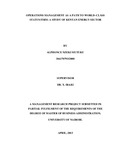| dc.description.abstract | A study was conducted in Kenya’s energy sector, with three objectives; the first being
to determine characteristics of world class status firms that were present in this sector,
and how deeply entrenched they were. The second being, to determine the prevalence
of programs that can turn the sector into world class status, and the third objective was
formulated to address the apparent disagreement between different research on the
number and nature of programs to turn a firm into a world class one. The research
design employed was a multiple case study on four firms in the Electricity Supplies
industries. The instrument used for data collection was a structured questionnaire
which was administered using the drop and pick later method. Average scores were
used to analyse the first objective, with responses on the open ended questions being
analysed thematically using content analysis. Chi-square analysis was employed to
determine if the results of objective one might have been due to chance, while
exploratory factor analysis was employed to determine the latent variables present, to
be able to address objective three. Two results from this research were confounding;
KENGEN had more world class characteristics than companies with a vision to be
world class i.e. KPLC and MSC. REA which performed poorly on most of the world
class characteristics had the best operational focus on customers, which was lacking
in the other three firms. The traditional view employed to gauge world class
organizations was confirmed, since the three firms which had a high number of
characteristics, were also found to employ an order winner, order qualifier model. The
study established that there were nine latent variables and not eight as some of the
previous research had advocated for. Customer focus was the only company wide
program that respondents mentioned in KPLC and REA as being practiced, though
there was evidence to suggest the existence of employee empowerment, quality focus,
operations flexibility, global competitiveness and technology in most of these firms.
Management within these firms should be informed of the elusive nature of these best
practices, they need to approach the world class objective by employing the
framework of nine companywide programs advocated for by this research, which has
over 250 other activities nested under the different programs. The difficult nature of
this task can be seen immediately, considering the planning, leadership, organizing,
directing, and controls needed to have in place a strategic plan or operational strategy,
which are some of the 252 activities which can lead to world class performance in
organizations. | en_US |

